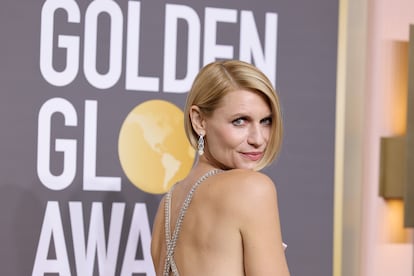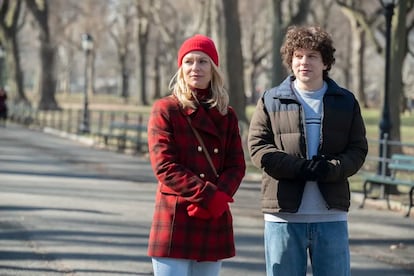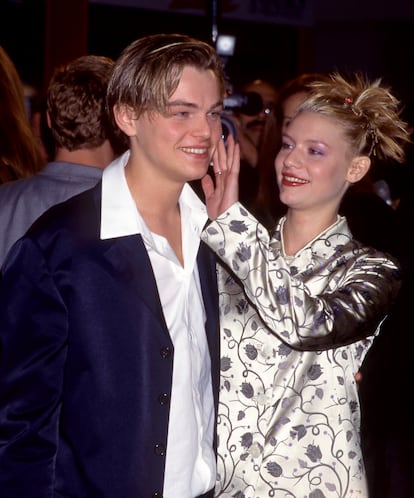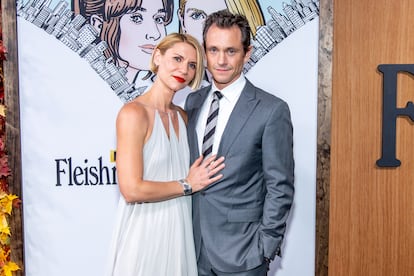From stormy teenager to evil mother: The triumphant return of Claire Danes
One of the great talents of her time, the New Yorker leads a discreet lifestyle like few others in Hollywood

“I just want to be a sane person.” In 1994, embarking on her acting career at just 15 years old, Claire Danes already knew what she wanted from the Hollywood dream. She didn’t want to fill her home with statuettes, add infinite zeros to her bank account or put her name on the Hollywood Walk of Fame. The greatest desire of that shy adolescent, who was immortalized skating down Venice Beach for the magazine ET, was “to be a person who has a life and who acts.” Almost three decades later, the New Yorker has achieved it, thanks to her ability to reconcile one of Hollywood’s most low-key lifestyles with some of the era’s greatest performances. Now she has added yet another achievement to her trajectory with the series Fleishman is in Trouble.

The miniseries, based on the book by Taffy Brodesser-Akner, tells the story of Toby and Rachel Fleishman (played by Jesse Eisenberg and Danes), who divorce after 15 years of marriage and two children. But Toby’s return to dating is disrupted when Rachel decides to vanish without warning, leaving her ex-husband in charge of the kids. The show’s nine episodes delve into a particular generation’s experience of mid-life crisis. It has sparked debate: outlets like The Cut have coined the term “the Fleishman Effect” to define the type of urban, professionally successful upper-middle-class women who find themselves in an existential spiral at that age. Claire Danes gives life to the role that press have called the best performance of the year, though award season left her empty-handed: Jennifer Coolidge’s performance in The White Lotus, also a pop phenomenon, overtook her.
The Rachel of Fleishman is in Trouble checks all the boxes shared by Danes’ characters over time. The New Yorker brought her characteristic intensity, determination and versatility to the role’s physical and intellectual challenge. In the now-cult series that catapulted her to fame, My So-Called Life, 13-year-old Danes gave a voice, face and spirit to an entire generation in her role as Angela Chase. She left millions of young women frustrated over the short life of her platonic love for Jordan Catalano. After the role, which won her a Golden Globe, she went on to shine in Little Women, then starred in another nineties hit, Baz Luhrmann’s Romeo and Juliet. The director called her “the Meryl Streep of her generation.” Filmmakers like Francis Ford Coppola and Oliver Stone agreed about her raw talent.
Stone himself wrote Danes a letter of recommendation for her application to Yale University, where she studied psychology. “I was told that my going to college wouldn’t be good for my career. I think that’s nonsense. It’s good to empower yourself by cutting yourself off from this business every once in a while,” she said. When her popularity was at its peak, the New Yorker decided to slow down and enjoy what she hadn’t gotten to do: living a normal youth. The daughter of a photographer and a textile designer, she had left school at age 12 to attend to professional obligations. Her education consisted of 20-minute classes in a trailer with a private tutor in the breaks during shoots. “I would be doing a death scene and then go back to my geometry lesson,” she told The Washington Post. Performing, for her, was a response to her lifelong fear of being alone: “Acting is the greatest answer to my loneliness that I have found.”
Putting education ahead of her meteoric career had a price that few would be willing to pay. After forming an unforgettable duo with Leonardo DiCaprio in the reinterpretation of Shakespeare’s classic, the director James Cameron wanted to resurrect the couple in his next mega-production, Titanic. Claire Danes rejected the role, which went to Kate Winslet, in one of the most successful and influential movies in film history. Danes doesn’t regret it. She was “terrified” about the levels of fame that she and DiCaprio had begun to experience: “It was going to propel me to something I knew I didn’t have the resources to cope with. I knew I had to do a lot of foundation building.”

Danes spent two years at Yale —enough, she said, to “learn how to think critically”— before getting back her lost time as an actress. Whether because of her own will or her inability to submit to the industry’s demands, it took her time to recover her career: she spent eight years making professional turns that seemed to put her future in danger. A vocal feminist long before the Me Too movement was popular in Hollywood Hills, she has spoken about the excessive physical scrutiny that follows actresses. “I remember a couple of Emmys ago, Lena Dunham and I were on the carpet together. We were singled out and criticized for having different body types. I was too skinny and she was too big. I feel like my body is monitored and commented on infinitely more than my male counterpart,” the 43-year-old actress told People.
In 2010, Danes turned to television to reach her dream of a stimulating but low-profile career. The miniseries Temple Gradin, and her role as the impulsive FBI agent Carrie Mathison in Homeland, turned her into the most-awarded actress this century. Four Golden Globes and three Emmys adorn her shelves, among more than a dozen nominations, to which her work in Fleishman is in Trouble added this year. Danes used the red carpet at the most recent Golden Globes ceremony to show off her pregnant belly, which will be her third child with Hugh Dancy after 10-year-old Cyrus and four-year-old Rowan. The couple met on the set of Evening and said “I do” in 2009.

Sign up for our weekly newsletter to get more English-language news coverage from EL PAÍS USA Edition
Tu suscripción se está usando en otro dispositivo
¿Quieres añadir otro usuario a tu suscripción?
Si continúas leyendo en este dispositivo, no se podrá leer en el otro.
FlechaTu suscripción se está usando en otro dispositivo y solo puedes acceder a EL PAÍS desde un dispositivo a la vez.
Si quieres compartir tu cuenta, cambia tu suscripción a la modalidad Premium, así podrás añadir otro usuario. Cada uno accederá con su propia cuenta de email, lo que os permitirá personalizar vuestra experiencia en EL PAÍS.
¿Tienes una suscripción de empresa? Accede aquí para contratar más cuentas.
En el caso de no saber quién está usando tu cuenta, te recomendamos cambiar tu contraseña aquí.
Si decides continuar compartiendo tu cuenta, este mensaje se mostrará en tu dispositivo y en el de la otra persona que está usando tu cuenta de forma indefinida, afectando a tu experiencia de lectura. Puedes consultar aquí los términos y condiciones de la suscripción digital.









































